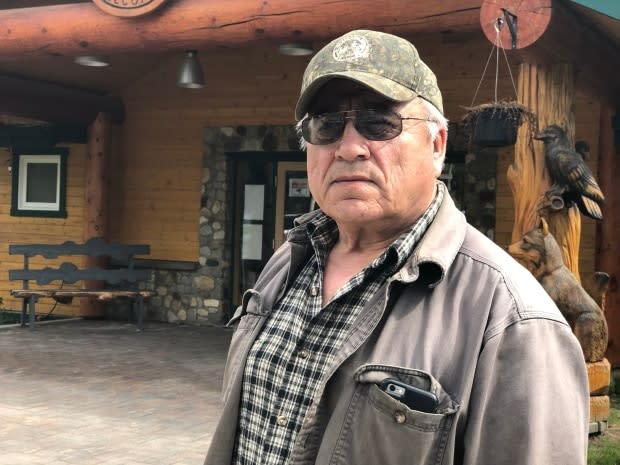Yukon First Nation, hunting groups at odds over moose hunting
A Yukon First Nation is asking moose hunters to stay off its traditional territory this season, while a local game association says hunters should carry on with their plans while also being respectful.
The Na-Cho Nyak Dun First Nation in central Yukon is asking non-citizens to refrain from hunting in its traditional territory due to increased pressure on the moose population there.
Moose hunting season in most of Yukon opened on Aug. 1.
Chief Simon Mervyn said it's important to maintain moose for the traditional subsistence culture of the Mayo-based First Nation.
"We're teaching our young ones moving forward how to maintain our culture and our tradition. We take them out on the land to fish and we take them out to the land to hunt," said Mervyn.
"It's a thing of pride, an absolute necessity for our people," he said.

The number of moose on the First Nation's traditional territory is declining, Mervyn said — and he wants non-citizens to consider that.
"You know with increased population in Yukon and more trophy hunters coming up and the big game outfitters being a problematic source in the depletion of our natural resources, that we were thinking, 'please think twice and refrain from coming up to our traditional territory,'" he said.
Licensed hunters are required to get First Nation approval to hunt on settlement A land, but not on non-settlement land. Under Yukon's Umbrella Final Agreement (UFA), First Nations own all surface and sub-surface rights on settlement A land.
First Nations' traditional territories are generally far larger than the settlement lands they negotiated as part of their Yukon land claim agreements.
Carry on with hunting plans, says game association
The executive-director of the Yukon Fish and Game Association, Eric Schroff, said hunters should go ahead with any plans they made this season, despite the Nacho Nyak Dun's concerns.
He said the land claims agreement created the Yukon Fish and Wildlife Management Board to deal with hunting issues.
The board has six First Nation appointees and six territorial and federal government appointees.
"The language, the spirit and the intent of the UFA provide for access to non-settlement lands for licensed hunters and it's worked well for many years," said Schroff.
"And I think one of the reasons why it's worked so well is that the management of wildlife in general, and moose in this instance, is the responsibility of the co-management board," he said
Schroff said moose populations have been stable in Yukon. But if there are low moose numbers in specific areas, those concerns can be dealt with by the board using scientific methods rather than through politics, he said.

He said many hunters see hunting as a way of helping their physical and mental well-being during the pandemic.
Hunting outfitters are not over-hunting in the Mayo area, said Shawn Wasel, the executive director of the Yukon Outfitters Association.
He said two outfitters that operate in part of the 10,000-square-kilometre Mayo moose unit zone deliberately avoid areas that can be more easily accessed by land or water, so as to leave more animals for local hunters.
Wasel said the outfitters have taken only five bull moose in that area in the past five years.
Four hunting outfitters use the Mayo airport as a staging base, he said. He said their hunts are at fly-in camps far from any roads or settlements.
"And they're harvesting moose that are many, many miles and days journey without aircraft from Mayo," he said.
"So these would be those that would not be typically available to ground-based harvesters."
He said much of the moose, caribou and sheep meat that comes from those hunts is shared with the Na-Cho Nyak Dun First Nation.
A shortage of moose in the Mayo area, Wasel said, would likely be caused by hunters' access to roads in the district and possibly predators.


